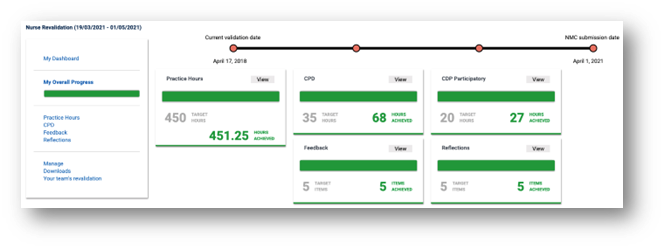
Learn what NHS revalidation is and how you can simplify the process for your employees.
NHS revalidation is a compulsory process that clinical staff need to go through in order to continue their registration and continue practising in the UK.
From nurses to doctors, there are strict guidelines and processes in place to ensure that clinical staff maintain a level of competency.
In this blog, we’ll run through:
- What revalidation is
- Why revalidation is important
- How revalidation works and its requirements
- Plus, how to better manage and log revalidation
Let’s get started.
What is revalidation?
Revalidation is the process that all nurses and midwives in the UK have to follow in order to maintain their registration with The Nursing and Midwifery Council (NMC).
Revalidation is required every three years in order to ensure that nurses and midwives are operating according to the Code in their practice.
These are the professional standards that nurses, midwives and nursing associates must uphold to be registered to practice in the UK.
The code works around four themes – prioritise people, practise effectively, preserve safety and promote professionalism and trust.
💡 Pro Tip
Over a third of NHS England staff are using a Think LMS. Learn how a healthcare LMS can help you improve compliance, onboarding and learning.
Why is revalidation important?
Compliance in the healthcare sector is essential. It promotes good patient care and equips clinical staff with the knowledge and tools they need to work safely and effectively.
🚀 Pro Tip
Want help tracking competency data for your employees? We show you how you can automate and simplify compliance using CST.
Track NHS competency data across Trusts
Revalidation, although about promoting good practise, is not a reflection of fitness to practise. Instead, it provides assurance to patients, the public and employers that you are confident and competent in your role.
More than that, revalidation aims to encourage a culture of reflection and growth both individually and among your peers.
How does revalidation work?
Every three years, nurses and midwives need to revalidate in order to show they are still working according to the code.
This process involves creating a portfolio of feedback and training to highlight that they are still meeting expectations and developing in their role.
As part of this process, all nurses, midwives and nursing associates will be asked to declare that they have received confirmation from an appropriate person in support of their revalidation application.
They will need to assign themselves a confirmer whose role it is to confirm that they have met the revalidation requirements.
Revalidation requirements
For nurses and midwives, there are a number of requirements needed to prove your knowledge is up to date and you are practicing safely and effectively.
Nursing revalidation requirements include:
- 450 practice hours
- 35 hours of CPD (20 hours must be participatory learning)
- 5 pieces of practice-related feedback
- 5 written reflective pieces
- Reflective discussion
- Health and character declaration
- Professional indemnity arrangement
- Confirmation
How to better log how nurses revalidate
When it comes to revalidation, it’s a long period of time to gather feedback, complete training and log reflections.
As such, nurses and midwives often struggle to maintain their portfolios, making the revalidation process more difficult. In order to support employees going through revalidation and to give organisations better oversight of the revalidation process, we created a revalidation portfolio that attaches to our Think Learning LMS.
Within the revalidation portfolio there are four main log types:
- CPD (participatory and non-participatory)
- Practice Hours
- Feedback
- Reflections
Users can view their target items/hours, their achieved items/hours, as well as be able to view and edit existing entries and add new entries.
They can also see a timeline (from their current revalidation date to their submission date, with a highlight on the current date).
In addition, they can confirm their insurance status and confirm a declaration and download submission templates, download their uploaded logs and supporting attachments and invite other users within Totara Learn to be their Reflective Discussion Partner or Confirmer.
If a user with a revalidation portfolio is also a manager, they will have a link within their portfolio to view their team members overall status on their portfolio, or the contents of that portfolio.
If a user has been invited to be a Reflective Discussion Partner or Confirmer, they will receive an email notification or can view a notification in the Task block, which they can accept or decline. Once accepted, the user’s portfolio will show up in a block which they can click to view.

Revalidation FAQs
When should I do nursing revalidation?
You need to revalidate every three years. But, you should start gathering feedback and evidence of CPD as soon as possible. 450 hours Is 150 hours per year, which equals to 12.5 hours per month.
How late can you revalidate NMC?
You must submit your application within three years of the end date of your previous revalidation. However, remember that it must be completed by the first day of the month in which your application is due. So, if your revalidation is due on April 12th based on your previous revalidation, your actual deadline will be April 1st.
Can you use mandatory training for revalidation?
Mandatory training that is not directly related to your practice (for example, fire training or health and safety training) cannot be included as part of your CPD.
What counts as CPD in nursing revalidation?
There are lots of ways you can complete CPD. A few examples of CPD for revalidation include training around blood transfusion, manual handling and safeguarding.
How do I get feedback for revalidation?
You should gather any feedback you receive and save it as part of your portfolio. You should also look to gather feedback through clinical supervision, one-to-ones or annual appraisals.
Support staff to revalidate with our portfolio
Enabling our revalidation portfolio means that nurses and midwives your practice can more easily log and prove their revalidation status.
It gives them one central point to add their feedback, CPD training and reflections. This eases the process for them, but also for their confirmer.
Book a demo to see the revalidation portfolio in action, and how we link it to other aspects of our LMS platform.

